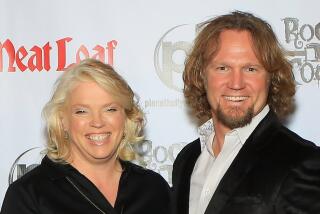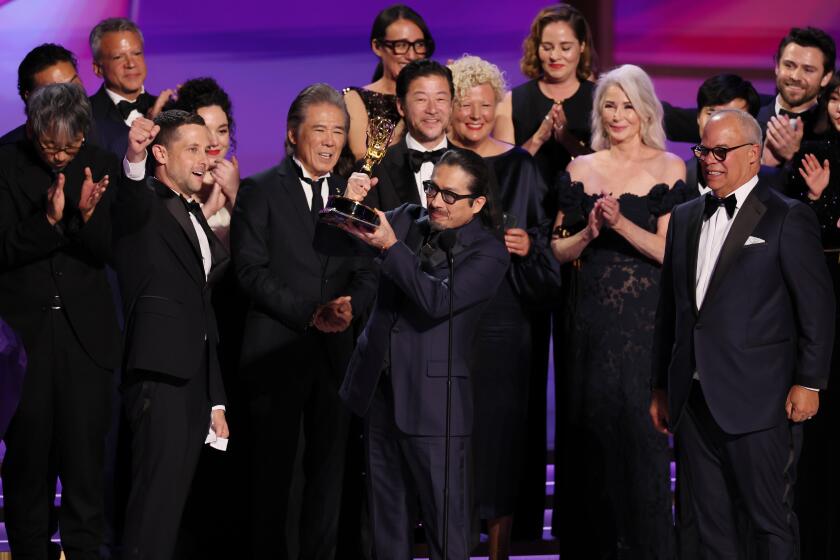Ovitz Details Tensions With Eisner
Michael Ovitz testified Tuesday that during his ill-fated tenure as Walt Disney Co. president he trusted Chief Executive Michael Eisner “1,000%” but was repeatedly undercut by the CEO.
Ovitz, taking the stand for the first time in a shareholder lawsuit against Disney directors, said Eisner thwarted an array of initiatives he proposed to expand the company’s global reach and marketplace clout. Eisner, he said, “didn’t want to spend.”
Among those ideas, Ovitz said, was one to purchase publisher Putnam Inc. for $350 million, a company he estimated is now worth more than $1 billion. He said he also was rebuffed in his efforts to buy a half-interest in Sony Music and gain a stake in the Internet search service Yahoo Inc. Moreover, he said Eisner nixed his attempt to sign pop singer Janet Jackson as a way to boost Disney’s Hollywood Records business.
Ovitz, 57, described the Burbank entertainment company as “not particularly sensitive to human beings,” and he elicited laughter throughout the courtroom when he said Disney executives did not get up from their desks to talk to one another. “You got calls from guys who were 25 feet from you,” he said.
Ovitz’s testimony in the lawsuit, originally filed in 1997, represented his most detailed description to date of his tumultuous tenure inside Disney and his stormy partnership with Eisner. In a twist, he and Eisner are on the same side as defendants in the closely watched trial, which began last week in Delaware Chancery Court. Lawyers representing shareholders allege that company directors rubber-stamped Ovitz’s hiring by his friend Eisner and failed to oversee his expensive dismissal 15 months later.
Ovitz left with a package of stock options and cash that plaintiffs’ lawyers estimate at $140 million. They are seeking to recoup $200 million in payments and interest for Disney’s coffers. Ovitz actually reaped $109 million because some options expired.
Disney directors say they acted appropriately and were obligated to pay Ovitz his severance because his performance did not amount to malfeasance or gross negligence.
Ovitz’s description of his plans to broaden Disney’s portfolio was intended, in part, to undermine earlier testimony by an expert witness hired by shareholders. The expert witness said the former Hollywood dealmaker should have been fired without severance partly because of his poor management of the areas that Ovitz contends he tried to strengthen.
Wearing a black suit and navy blue tie, Ovitz appeared self-assured and composed during questioning by his attorney, sipping bottled water and scribbling notes on a yellow pad.
Before his testimony, Ovitz mingled with reporters and attorneys, musing about local eateries and the small-town charm of Georgetown, which he likened to a movie set. He signed an autograph for a security guard who asked Ovitz if there was anything he wanted. “I want a lobotomy,” he quipped.
The courtroom was jammed with nearly three dozen lawyers and their staff as well as a dozen reporters, who lined up outside the colonial-style courthouse at 6:30 a.m. to secure seats. A mob of photographers and TV cameramen jostled for position as Ovitz left the building for lunch. He was whisked away by his attorneys to an adjacent office for a catered meal.
As the co-founder of Creative Artists Agency, Ovitz once held sway as the most powerful man in Hollywood, with a roster of top talent that included Dustin Hoffman and Steven Spielberg.
But Disney shareholders allege that Ovitz never lived up to his star billing.
In his testimony, Ovitz countered that the deck was stacked against him almost from the moment he arrived at Disney in 1995. Ovitz testified that before his hiring, he expressed reservations to Eisner about the steep learning curve he would have as an executive of his first publicly held company.
“I said to Michael: ‘I need a year,’ ” Ovitz said. “You have to teach me what to do.”
Ovitz also recalled a meeting at Eisner’s home shortly before his hiring was announced. There, he said, then-Chief Financial Officer Steve Bollenbach made it clear he did not consider Ovitz his boss.
“Mr. Bollenbach looked at me straight in the eye and said, ‘Hello, I’m not reporting to you,’ ” Ovitz said. Then-Chief Counsel Sandy Litvack, who also was at Eisner’s home, also said he wouldn’t report to him, according to Ovitz.
“I waited for Michael to do what I expected him to do, which is support me,” he testified. “He didn’t say anything.”
Asked why he didn’t quit then, Ovitz said he assumed Eisner would smooth things over. “Frankly, I trusted him 1,000%,” Ovitz said. “He was one of my closest friends. I assumed over the next few months we would work it out.”
Instead, Ovitz said, Eisner and other executives blocked or resisted ideas he offered to bolster the company’s bottom line and improve its frayed relations with talent.
He said Litvack chastened him for giving a $1,200 Roy Lichtenstein print to actor Tim Allen in an effort to smooth relations with the actor, who had walked off the set of hit TV show “Home Improvement.”
Ovitz said Eisner opposed a proposed deal with TV producer Brad Grey, who helped develop “The Sopranos,” “because it would cost too much money.”
He also said he could have settled a bitter lawsuit between Disney and former studio chief Jeffrey Katzenberg for about $85 million, but was told “not to do the deal.” Disney ended up paying Katzenberg more than $250 million.
At one point, Ovitz suggested in his testimony that he kept Eisner from firing Robert Iger, now Disney’s president and the only internal candidate to succeed Eisner, who has said he will retire in 2006 when his contract expires.
When Ovitz came on board, Disney had announced a deal to acquire Capital Cities/ABC. Iger was ABC’s president.
Ovitz testified that Eisner “had a problem with Mr. Iger” and wanted his new second-in-command to deal with the issue. “I thought he deserved a chance,” Ovitz said of Iger.
Disney disputed Ovitz’s testimony. A spokeswoman said Iger signed a five-year contract to head ABC and integrate the operation into Disney at Eisner’s request in July 1995, before Ovitz was hired. Separately, Eisner attorney Gary Naftalis disputed Ovitz’s depiction of his boss as a man unwilling to take risks. “Michael Eisner’s public record of outstanding accomplishments at the Walt Disney Co. speaks for itself,” his attorney said.
Ovitz is expected to resume his testimony today.
More to Read
The biggest entertainment stories
Get our big stories about Hollywood, film, television, music, arts, culture and more right in your inbox as soon as they publish.
You may occasionally receive promotional content from the Los Angeles Times.











